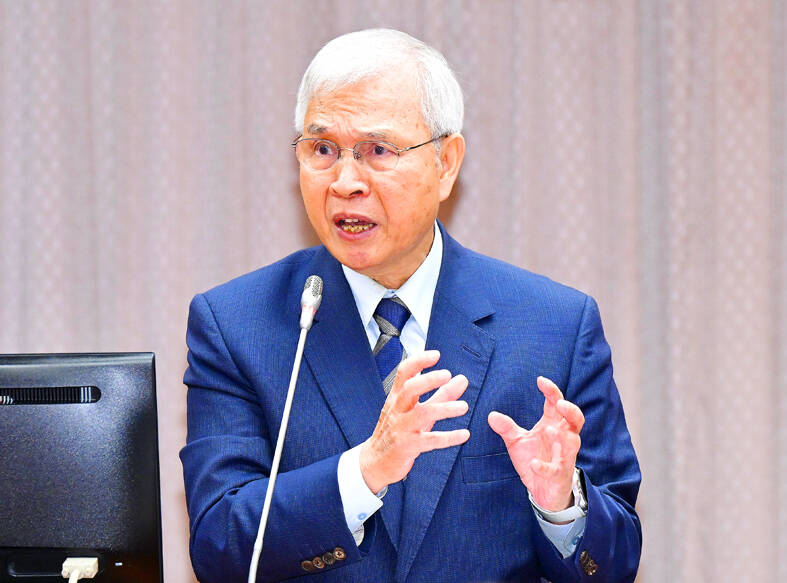The incoming administration of US president-elect Donald Trump is unlikely to impose stiff tariffs on Taiwan’s advanced chips as well as information and communications technology (ICT) products, because they are special and strategic materials the US needs, central bank Governor Yang Chin-long (楊金龍) said yesterday.
“Trump’s trade policies may affect Taiwan’s economy and financial markets through multiple channels... We need to be careful in dealing with monetary policy and foreign exchange,” Yang said at a meeting of the legislature’s Finance Committee in Taipei.
After Trump’s return to the White House in January next year, it might become normal for Taiwan to be on the US’ currency manipulation watch list given the nation’s rising trade surplus with the US in the wake of US-China trade disputes, Yang said.

Photo: Liao Chen-hui, Taipei Times
Taiwan benefited from order transfers during Trump’s first four-year term, the governor said.
As a result, Taiwan met two of the three criteria the US Department of the Treasury uses to judge currency manipulation, namely a trade surplus larger than US$15 billion and a current account surplus in excess of 3 percent of GDP, Yang said.
The governor attributed the trade imbalance to aggressive purchases of advanced chips and ICT products by US tech titans to develop artificial intelligence and new-generation consumer electronic gadgets.
That prompted Yang to doubt Trump would raise tariffs on Taiwan’s exports as they are special and strategic materials the US needs.
“The trend [of advanced chips designed by the US and made in Taiwan] is sustainable, as the US is seeking to stay ahead of China in technology competition,” Yang said.
The central bank and the US Department of the Treasury exchange views on the currency matter twice a year, he said.
The trade friction between the US and China looks to escalate if Trump makes good on his campaign pledge to raise trade barriers with the world and set off another round of global supply chain realignment, Yang said.
Higher tariffs and production base relocation would raise production costs and fuel inflation, especially for firms that rely on imported raw materials, he said.
Such expectations have been reshaping the interest rate trajectory and accounted for the 1.8 percent decline in the New Taiwan dollar against the US dollar following Trump’s electoral win last week, Yang said.
Trade barriers might slow GDP growth in China, Taiwan’s largest export destination, and local firms should pay close attention, he said.
Taiwan could move to reduce trade surpluses with the US through massive procurement of US agricultural, energy and national defense products, Yang said.
Investment in the US by local firms is another solution, the governor said, citing the example of Taiwan Semiconductor Manufacturing Co (台積電).

GROWING OWINGS: While Luxembourg and China swapped the top three spots, the US continued to be the largest exposure for Taiwan for the 41st consecutive quarter The US remained the largest debtor nation to Taiwan’s banking sector for the 41st consecutive quarter at the end of September, after local banks’ exposure to the US market rose more than 2 percent from three months earlier, the central bank said. Exposure to the US increased to US$198.896 billion, up US$4.026 billion, or 2.07 percent, from US$194.87 billion in the previous quarter, data released by the central bank showed on Friday. Of the increase, about US$1.4 billion came from banks’ investments in securitized products and interbank loans in the US, while another US$2.6 billion stemmed from trust assets, including mutual funds,

Micron Memory Taiwan Co (台灣美光), a subsidiary of US memorychip maker Micron Technology Inc, has been granted a NT$4.7 billion (US$149.5 million) subsidy under the Ministry of Economic Affairs A+ Corporate Innovation and R&D Enhancement program, the ministry said yesterday. The US memorychip maker’s program aims to back the development of high-performance and high-bandwidth memory chips with a total budget of NT$11.75 billion, the ministry said. Aside from the government funding, Micron is to inject the remaining investment of NT$7.06 billion as the company applied to participate the government’s Global Innovation Partnership Program to deepen technology cooperation, a ministry official told the

Taiwan Semiconductor Manufacturing Co (TSMC, 台積電), the world’s leading advanced chipmaker, officially began volume production of its 2-nanometer chips in the fourth quarter of this year, according to a recent update on the company’s Web site. The low-key announcement confirms that TSMC, the go-to chipmaker for artificial intelligence (AI) hardware providers Nvidia Corp and iPhone maker Apple Inc, met its original roadmap for the next-generation technology. Production is currently centered at Fab 22 in Kaohsiung, utilizing the company’s first-generation nanosheet transistor technology. The new architecture achieves “full-node strides in performance and power consumption,” TSMC said. The company described the 2nm process as

Even as the US is embarked on a bitter rivalry with China over the deployment of artificial intelligence (AI), Chinese technology is quietly making inroads into the US market. Despite considerable geopolitical tensions, Chinese open-source AI models are winning over a growing number of programmers and companies in the US. These are different from the closed generative AI models that have become household names — ChatGPT-maker OpenAI or Google’s Gemini — whose inner workings are fiercely protected. In contrast, “open” models offered by many Chinese rivals, from Alibaba (阿里巴巴) to DeepSeek (深度求索), allow programmers to customize parts of the software to suit their